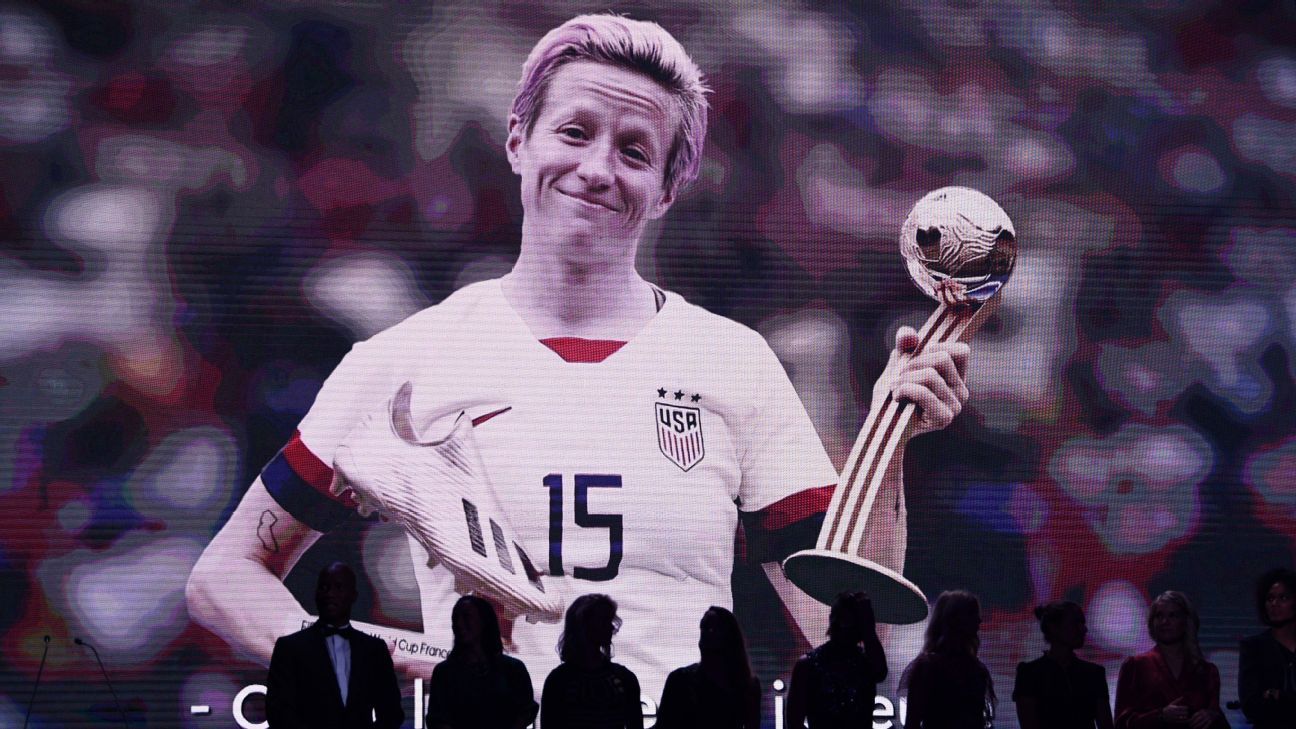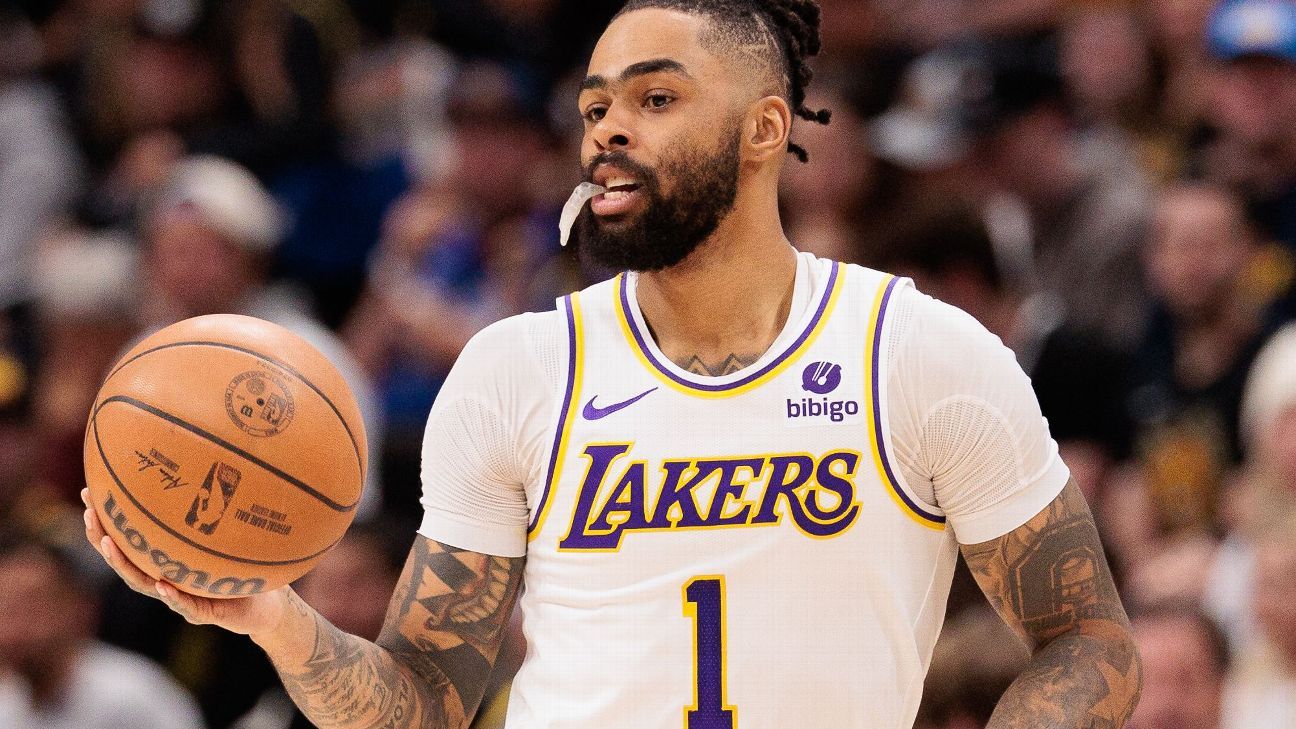
PARIS, France -- Megan Rapinoe, the second-ever winner of the women's Ballon d'Or given to the best player on earth, had better things to do than pick up her award in Paris on Monday. "Bonsoir everyone!" she called out cheerily to the theater packed with dinner jackets and ballgowns, in a video that looked as if it was recorded in the corner of her Seattle living room. She apologised for not making it over: "It's a bummer." Lionel Messi, Kylian Mbappé and Virgil van Dijk were among those who had shown up to applaud her, yet her snubbing of the ceremony seemed fair enough: judged by her off- as well as on-field impact, she may be soccer's biggest icon today.
Messi, Rapinoe win Ballon d'Or prizes
A really good icon arrives at just the right moment in history. We're living in an era when women, sexual minorities and non-white people are saying we won't be treated as second-class humans anymore. Certain men in the traditional ruling class reply we get to decide that. And into that battle walks Rapinoe. Her expressive face, uninhibited humor and sense of style make her an ideal spokeswoman for almost any cause and as an activist, she's an update on past stars of her sport.
The face of American soccer 20 years ago, Mia Hamm, "was sort of a gateway to the world becoming used to female soccer players," says Gemma Clarke, author of Soccerwomen. "She was marketed as wholesome, as the girl next door." By contrast, adds Clarke, Rapinoe wouldn't have been accepted as an icon "even five years ago."
Now 34, Rapinoe spent most of her career just short of front-rank status yet even without the protection of stardom, she never shied away from unpopular causes. She campaigned for prisoners' rights on behalf of her brother, Brian, who has been in and out of prison with drug problems. A former white supremacist with swastika tattoos, he watched many of his sister's triumphs from behind bars.
In 2016, she became the first white American athlete to kneel during the national anthem in solidarity with the anti-racism campaigner and NFL player, Colin Kaepernick. "It took guts. It could have ended her career," says Clarke. The U.S. Soccer Federation responded by banning the act of kneeling. Meanwhile, Rapinoe and her girlfriend, WNBA star Sue Bird, were "normalizing a lesbian relationship" in American public life, notes Brenda Elsey, coauthor of Futbolera: A History of Women and Sports in Latin America.
But Rapinoe's joint careers as athlete and activist reached their crescendo this summer. If the U.S.'s victory at the World Cup in France was expected, her domination of the tournament wasn't. She hasn't been the best female player of her era, but she peaked when it mattered. "She's a big-time player," says the USWNT's coach Jill Ellis. Rapinoe's confidence -- exemplified by her trademark arms-outstretched celebration, known as "the Rapinoe" -- was a rejection of old-style submissive femininity, and particularly stunning coming from a working-class woman.
Rapinoe dared take on Trump, the candidate who had swept most voters in her rural northern Californian hometown -- including her own father. She promised she wouldn't be visiting the "[expletive] White House" if the U.S. became world champions. "Megan should win first before she talks!" tweeted Trump. A few days later she'd not only won her second World Cup, but also the Golden Ball for best player and Golden Boot for highest scorer.
Why Messi deserved the Ballon d'Or over Van Dijk
Julien Laurens says Lionel Messi separated himself from other Ballon d'Or finalists by carrying Barcelona.
Rapinoe has called herself "a walking protest" and her advocacy of the U.S. team's lawsuit for equal pay was another feet-first leap into one of the social issues of 2019. Her own career had almost been cut short by gender inequality: four years ago, she tore her ACL while practicing with the USWNT on a grass field in Hawaii so bad that it was lined with plastic-covered sewer plates. "Equal pay!" the crowd in Lyon chanted after the Americans defeated the Dutch in the World Cup final, a chant that's resounded through stadiums across the National Women's Soccer League this year. But the USWNT's lawsuit shines a light for women beyond sport, and beyond the U.S. too.
In modern sports, activism is usually treated as a potential distraction. Speaking in platitudes or sponsor-fed slogans is considered the professional thing to do. Even some of Rapinoe's teammates in the national team seem to take that view. They talked about wanting to "stay in their bubble" during the tournament, says Caitlin Murray, author of The National Team, about the USWNT. Rapinoe's spat with Trump threatened to pull them out of it but the furore didn't distract them; equally, it seemed to energize her.
Rapinoe is more than a professional: she is a performer. On the pitch she'll joke with the referee, banter with opponents, or acknowledge a fan, says Murray. "She always looks like she's having fun." Her irreverence seems to help her stay loose on the field, and lets her relax a potentially overstressed locker room.
Wowing the world has left her little time for her Seattle club, Reign FC: her stats for this season are no goals and no assists in just 333 minutes of play, but then, she's made for greater things, like further investment in women's soccer. In a video celebrating her Ballon d'Or, her father mused: "I don't know where you go from here: the best player of the universe?" In fact, her international playing career may culminate with next year's Tokyo Olympics, but that would surely just unleash her onto a new path, or maybe various paths. "At this point she's so popular that she could do almost anything," says Elsey. It's easy to picture her running for political office, but that feels perhaps too tritely obvious for her.
"That's the thing about the greatest icons," says Clarke. "There's really nobody to compare them to."














 Phone: (800) 737. 6040
Phone: (800) 737. 6040 Fax: (800) 825 5558
Fax: (800) 825 5558 Website:
Website:  Email:
Email: 






